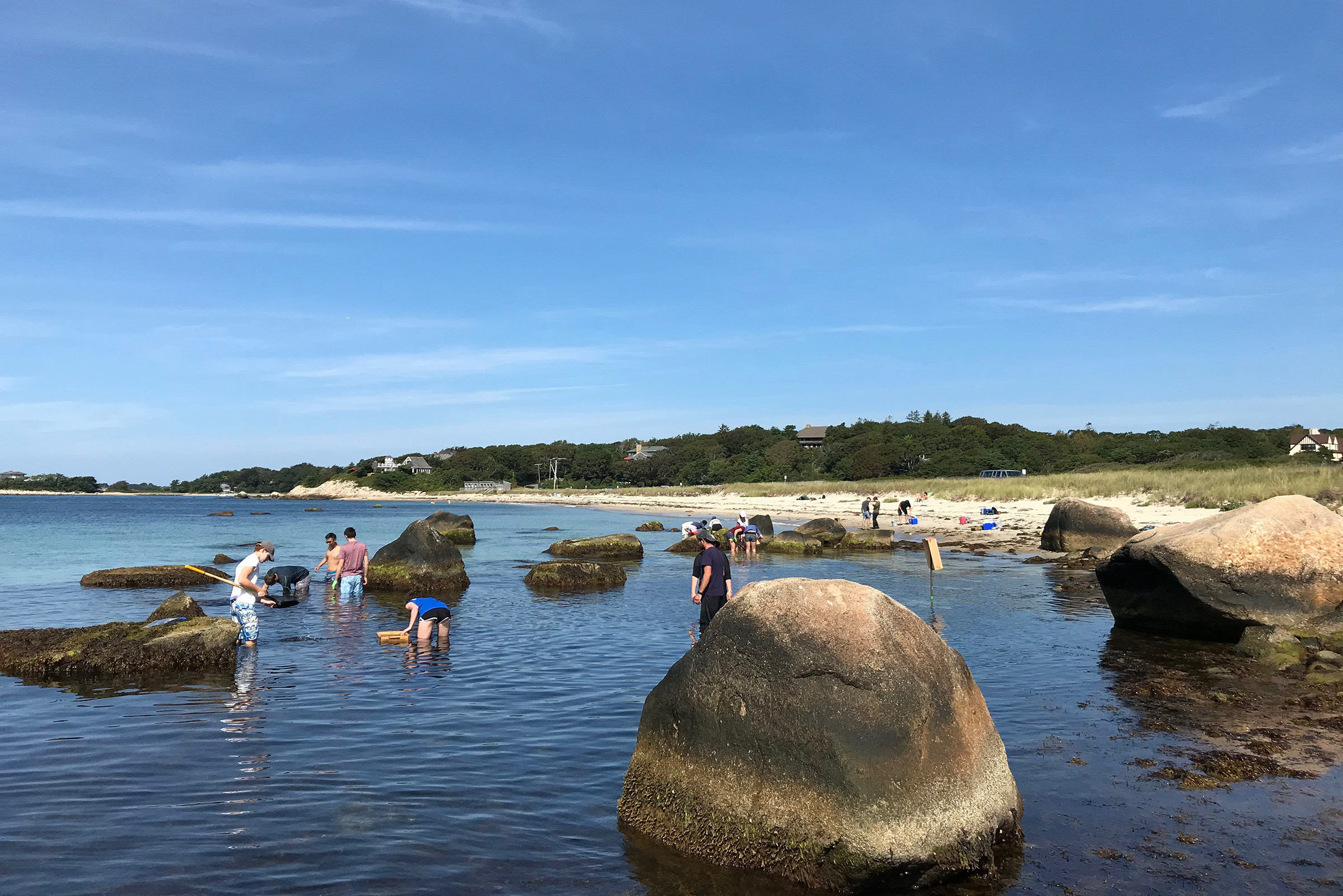MBL September Courses Launch UChicago Students into Research

By Stephanie McPherson
For the second year running, a diverse group of University of Chicago undergraduates enjoyed three weeks of intensive study at the Marine Biological Laboratory (MBL) while enrolled in the university's MBL September Courses.
These students experience full immersion in the research world of a field of science. With small lab teams and many hours spent working directly with experienced scientists and faculty, they benefit from the rich learning environment at MBL, where education and research training are merged.
In the “Biodiversity and Genomics” course, students engaged in ongoing research projects in MBL labs, including a phylogenetic study of populations of local squid. Students in the “Microbiomes Across Environments” course developed their own research questions, assessing microbial populations living on surfaces ranging from lobster claws to teeth. In “Observing Proteins in Action," students designed and built electrical and optical instruments to measure cell activity, including action potentials in Venus flytrap motor cells and in squid skin pigment cells.
Below, Profs. Jocelyn Malamy and Eric Schwartz share a few thoughts about the September Courses. Malamy was the main force in launching these courses in 2017; she is an Associate Professor in the Department of Molecular Genetics and Cell Biology and Master of the Biological Sciences Collegiate Division at the University of Chicago, as well as Interim Director of Education at MBL.
Schwartz is a co-director of the "Proteins in Action" course and Professor of Pharmacological and Physiological Sciences at the University of Chicago.
How do students benefit from the intensive schedule and more instructor contact than is typical in a traditional college course?
Jocelyn Malamy: Total immersion courses such as these are completely different from standard college courses. They allow students to focus entirely on one topic, think deeply, and explore in the lab. The continuity of the courses allows students to set up experiments and follow through on them in a way that is impossible in a traditional schedule, where students are coming to lab once a week.
Eric Schwartz: The faculty’s constant availability allowed us to simultaneously interact with each small group and to cover an unusually broad range of topics and techniques. Some of the techniques were state of the art, e.g., detecting conformational changes in proteins with fluorescent signals and optical stimulation by energy transfer from nanoparticles.
 Students in “Biodiversity and Genomics” collect samples in Woods Hole. In this course, directed by Oscar Pineda-Catalan, groups of students undertook a “community biodiversity” project that involved morphologically and genetically identifying marine invertebrates collected from four field sites in the Woods Hole region. The data generated through these projects will be deposited into publicly available databases, such as iNaturalist and GenBank, so that they can be utilized by the greater scientific community. Credit: Oscar Pineda-Catalan.
Students in “Biodiversity and Genomics” collect samples in Woods Hole. In this course, directed by Oscar Pineda-Catalan, groups of students undertook a “community biodiversity” project that involved morphologically and genetically identifying marine invertebrates collected from four field sites in the Woods Hole region. The data generated through these projects will be deposited into publicly available databases, such as iNaturalist and GenBank, so that they can be utilized by the greater scientific community. Credit: Oscar Pineda-Catalan.“Proteins in Action” was taught by four instructors and a teaching assistant with overlapping research interests. We were fortunate to be joined for part of the time by a postdoctoral scientist from Howard Hughes Medical Institute’s Janelia Research Campus. In addition, a colleague who owns a technical company in Germany came during the final week and worked directly with the students on individual projects using equipment manufactured by her company. She also gave a presentation about her path from graduate student to owner of a successful biotech company. Thus, we were three women and four men, tenured professors and job seekers, scientists at the start and end of their careers, individuals from academic environments and business. Consequently, the students were able to question and listen to individuals with a variety of styles and views.
The September Courses are open to students in all majors. How do non-science majors benefit from being in a research environment like MBL?
Eric Schwartz: Extensive contact with the faculty allows informal, unscripted conversation. It was not our purpose to sell careers in science. Instead, we offered a life experience. We had students interested in neurobiology and medicine, computer science, one in molecular engineering, one in urban planning, one in art conservation, and several undecided or uncommitted. Yes, we present an intensive course in biophysics. But the intent was to make our students comfortable with science. Too often science is presented in what I will call the Dr. Frankenstein complex – as strange, inaccessible, or different from common experience. Our goal is to allow students to leave the University of Chicago as science comfortable, regardless of their future careers.
Jocelyn Malamy: For many [of the students], this was their first opportunity to do experiments where the results were not known in advance. It allowed them to grapple with the realities of research, where techniques have to be optimized and first attempts often fail. In these courses, students find that with focus, teamwork, perseverance and a bit of courage, they are able to make brand new discoveries! This principle applies equally to scholarly research in all fields.
Homepage photo caption: Christina Ford and Alyssa Condie display the plans for and the patch clamp amplifier that they built from scratch in the "Proteins in Action" course. Credit: Megan Costello
—###—
The Marine Biological Laboratory (MBL) is dedicated to scientific discovery – exploring fundamental biology, understanding marine biodiversity and the environment, and informing the human condition through research and education. Founded in Woods Hole, Massachusetts in 1888, the MBL is a private, nonprofit institution and an affiliate of the University of Chicago.